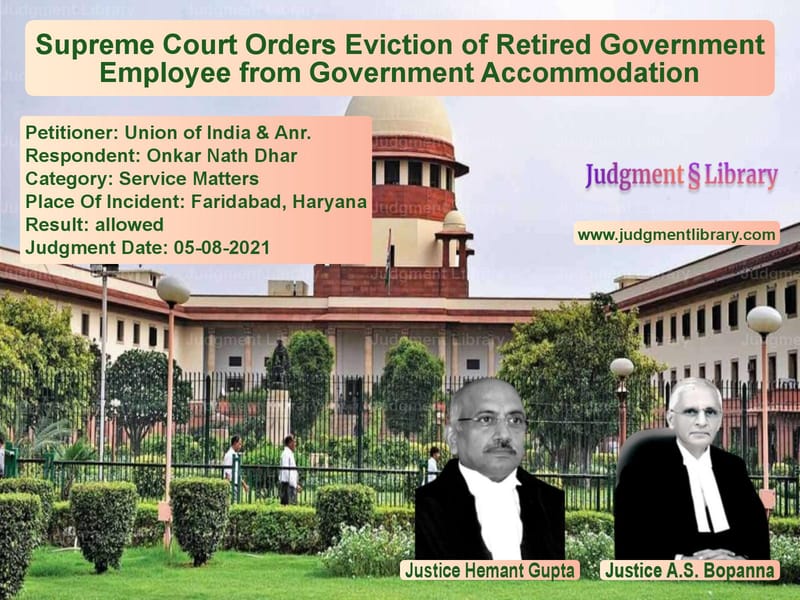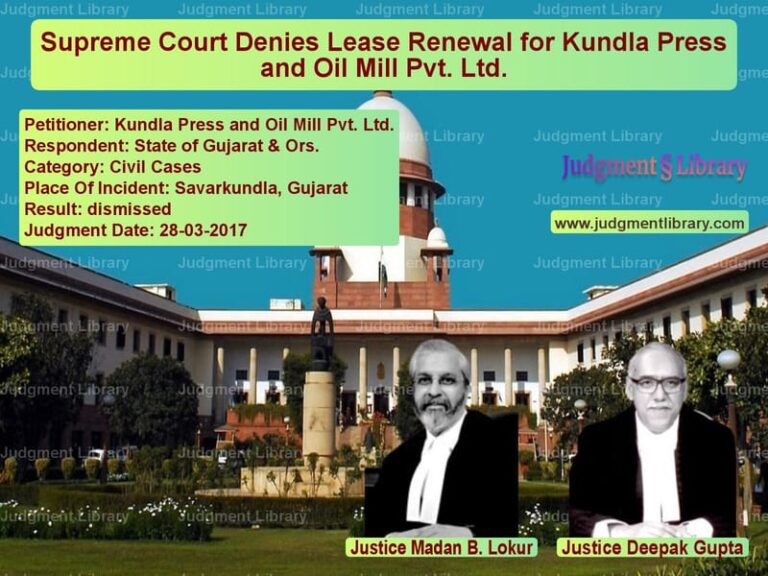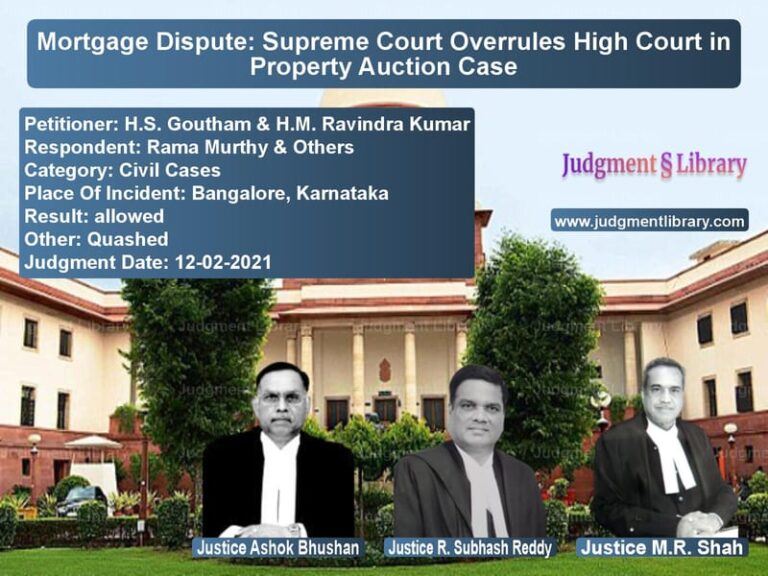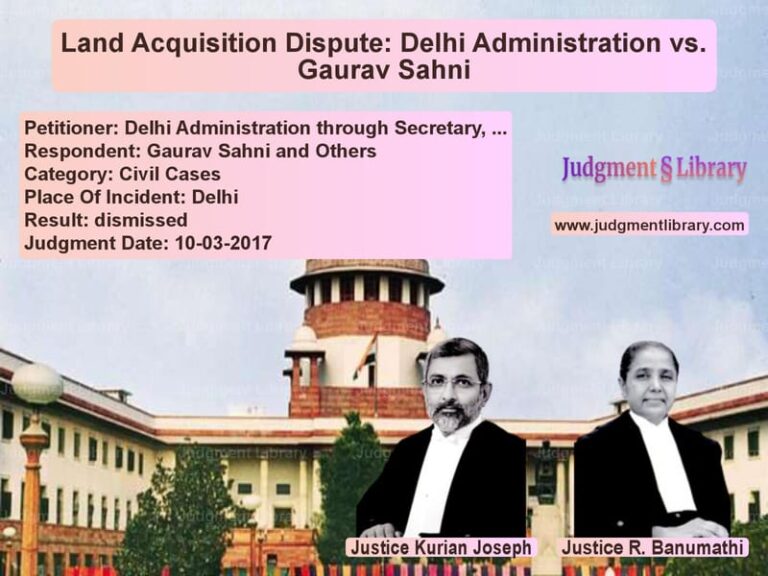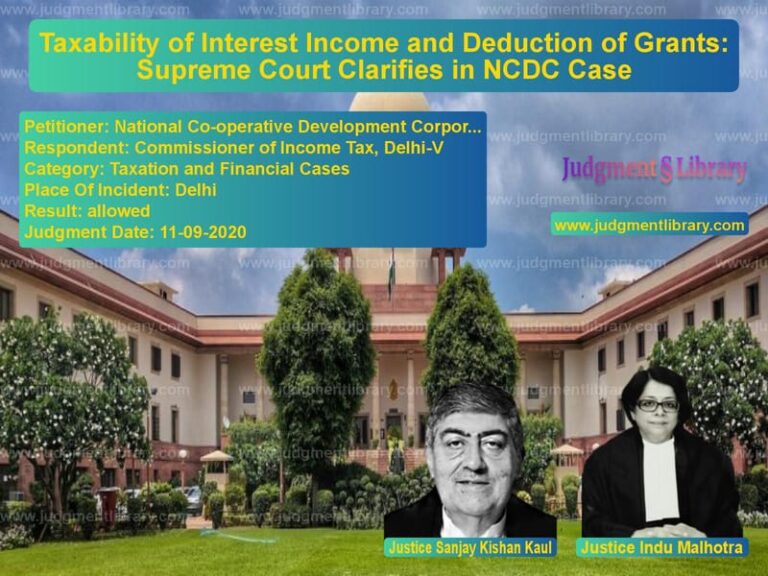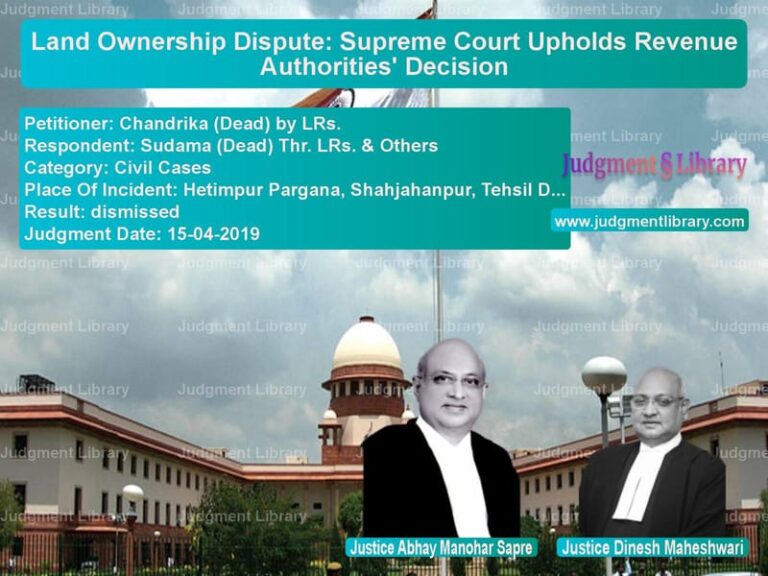Supreme Court Orders Eviction of Retired Government Employee from Government Accommodation
The case of Union of India & Anr. vs. Onkar Nath Dhar deals with the issue of government accommodation retention by retired employees. The Supreme Court had to decide whether a retired government officer, who was a Kashmiri migrant, could continue occupying government accommodation beyond his retirement, given the prevailing security conditions in Jammu and Kashmir.
The case arose after the Punjab & Haryana High Court allowed the respondent, Onkar Nath Dhar, a retired officer from the Intelligence Bureau, to retain his government-allocated residence in Faridabad on a nominal license fee. The Supreme Court ultimately overturned this decision, ruling that government accommodation is meant for serving officers and not retirees.
Background of the Case
The dispute originated when Onkar Nath Dhar, a retired Intelligence Bureau officer, was asked to vacate his government accommodation following his retirement. Key facts of the case include:
- The respondent was transferred to Delhi and later to Faridabad due to unrest in Jammu and Kashmir.
- He retired from service on October 31, 2006.
- He requested an extension to retain his government accommodation, which was granted for one year.
- He later sought permission to continue occupying the residence on a nominal license fee, citing the security situation in Jammu and Kashmir.
- The government issued an eviction notice under the Public Premises (Eviction of Unauthorised Occupants) Act, 1971.
- His appeal was dismissed by the Additional District Judge, Faridabad.
- The Punjab & Haryana High Court ruled in his favor, stating that he should be allowed to stay in the government residence or be provided alternative accommodation.
- The Union of India appealed against this decision in the Supreme Court.
Petitioner’s Arguments
The Union of India argued that:
- Government accommodation is strictly meant for serving officers and cannot be occupied by retired personnel.
- The respondent was drawing pension and had no legal right to demand continued occupation of government property.
- There was no government policy to provide permanent housing to retired officials, even if they were Kashmiri migrants.
- The government had already implemented a scheme offering either transit accommodation or cash compensation for displaced persons.
- Allowing one individual to retain government accommodation on compassionate grounds would set a dangerous precedent.
- The Punjab & Haryana High Court’s decision was contrary to established legal principles and government policies.
Respondent’s Arguments
Onkar Nath Dhar, the respondent, argued that:
- He was a Kashmiri migrant and could not return to his home due to prevailing security threats in Jammu and Kashmir.
- He was transferred from Jammu to Delhi and then to Faridabad due to the circumstances arising from terrorism in his native state.
- The government had provided long-term accommodation to other similarly placed migrants, and he was being singled out unfairly.
- The eviction order violated his right to shelter under Article 21 of the Indian Constitution.
- The High Court had correctly recognized the exceptional circumstances surrounding his case.
Key Legal Issues
The Supreme Court examined the following legal issues:
- Whether a retired government officer could retain government accommodation indefinitely on the ground of being a Kashmiri migrant.
- Whether the Punjab & Haryana High Court had erred in allowing the respondent to stay in government property or be provided alternative accommodation.
- Whether the eviction order violated the respondent’s right to shelter under Article 21 of the Indian Constitution.
- Whether the government’s policy on providing transit accommodation or cash compensation for migrants was sufficient in addressing such cases.
Court’s Observations
The Supreme Court made several significant observations:
1. Government Accommodation is for Serving Officers
The Court emphasized that government housing is meant to facilitate serving officers in discharging their duties and is not a retirement benefit.
“Government accommodation is meant for serving officials. It is not an individual’s right to claim continued occupation after retirement.”
2. No Special Rights for Kashmiri Migrants in Government Housing
The Court acknowledged the hardships faced by Kashmiri migrants but ruled that such challenges did not entitle them to permanent government housing.
“The right to shelter does not extend to a right to government accommodation. The State has provided alternative transit accommodation or financial compensation for migrants.”
3. High Court’s Decision Was Against Legal Precedent
The Supreme Court found that the Punjab & Haryana High Court had exceeded its jurisdiction by directing the government to provide alternative accommodation.
“The judiciary cannot dictate housing policies to the government. Accommodation beyond service tenure is a matter of policy, not legal entitlement.”
4. The Right to Shelter Does Not Mean Government Housing
The Court clarified that while the right to shelter is fundamental under Article 21, it does not mean a retired official is entitled to government property indefinitely.
“A section of society, including retired government employees, cannot claim preferential treatment over millions of homeless citizens.”
Final Verdict
The Supreme Court allowed the appeal and ruled:
- The Punjab & Haryana High Court’s decision was set aside.
- The eviction order against the respondent was upheld.
- The respondent was granted time until October 31, 2021, to vacate the government premises.
- The government must report on action taken against other retirees occupying government accommodation beyond their entitlement.
The Court concluded:
“Compassion cannot be a basis for indefinitely allotting government accommodation to retirees. Government resources must be used efficiently to serve the needs of current officials.”
Implications of the Judgment
This ruling has significant implications for government housing policies:
- Reinforcing Policy Guidelines: Government accommodation remains exclusively for serving officials.
- End of Arbitrary Allotments: Retired employees cannot claim indefinite occupation of government premises.
- Judicial Limits in Housing Policies: Courts cannot direct the government to provide housing beyond what policy allows.
- Efficient Resource Allocation: The judgment ensures fair distribution of government housing to those actively in service.
Overall, this ruling reaffirms that while the government has a duty to support displaced persons, it is not obligated to provide permanent government accommodation to retired officials.
Petitioner Name: Union of India & Anr..Respondent Name: Onkar Nath Dhar.Judgment By: Justice Hemant Gupta, Justice A.S. Bopanna.Place Of Incident: Faridabad, Haryana.Judgment Date: 05-08-2021.
Don’t miss out on the full details! Download the complete judgment in PDF format below and gain valuable insights instantly!
Download Judgment: union-of-india-&-anr-vs-onkar-nath-dhar-supreme-court-of-india-judgment-dated-05-08-2021.pdf
Directly Download Judgment: Directly download this Judgment
See all petitions in Employment Disputes
See all petitions in Public Sector Employees
See all petitions in Pension and Gratuity
See all petitions in Termination Cases
See all petitions in Recruitment Policies
See all petitions in Judgment by Hemant Gupta
See all petitions in Judgment by A. S. Bopanna
See all petitions in allowed
See all petitions in supreme court of India judgments August 2021
See all petitions in 2021 judgments
See all posts in Service Matters Category
See all allowed petitions in Service Matters Category
See all Dismissed petitions in Service Matters Category
See all partially allowed petitions in Service Matters Category

